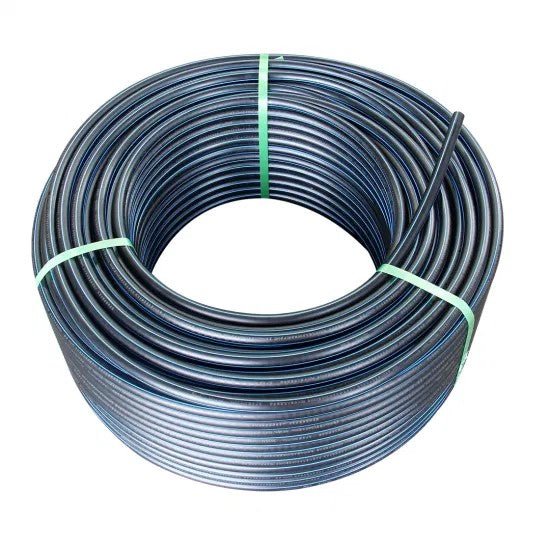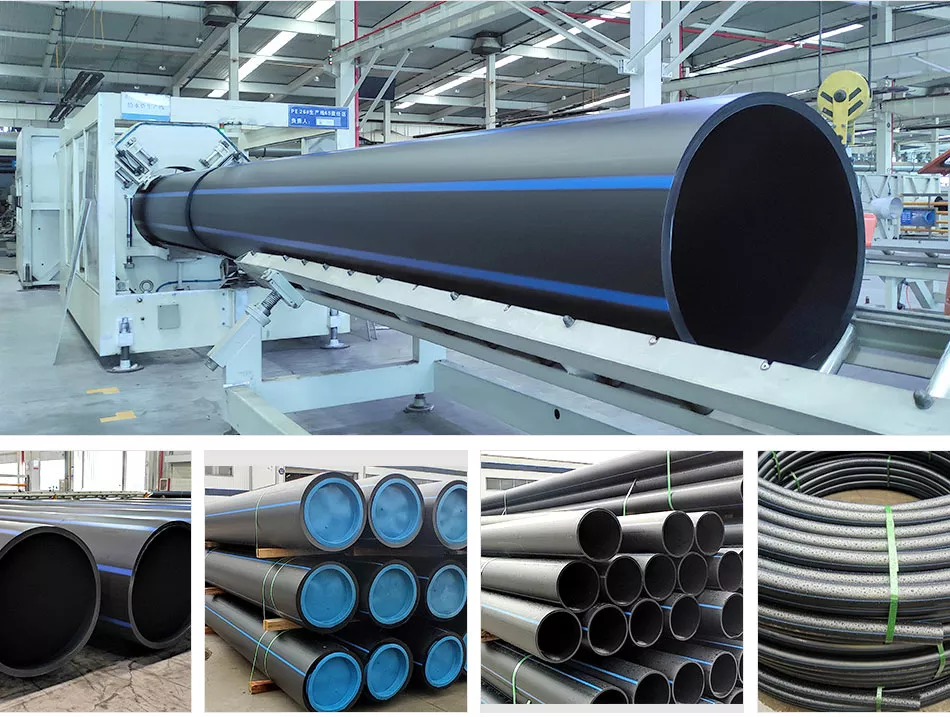Key Insights of custom hdpe pipe manufacturing Midland TX for Engineering Projects
Wiki Article
Explore the Production Refine Behind High-Quality HDPE Pipe and Its Applications
The production procedure of high-grade HDPE pipelines is detailed and methodical. It begins with the option of basic materials that improve efficiency. Following this, ethylene undertakes polymerization to create material, which is then formed through extrusion. Quality assurance is critical, ensuring that the last product meets stringent requirements. However, the journey of HDPE pipes does not finish with manufacturing. Their applications throughout numerous industries expose a broader importance worth taking a look at.Understanding HDPE: Features and Advantages

High-density polyethylene (HDPE) is a functional polycarbonate recognized for its toughness and resistance to various ecological variables. This product exhibits superb tensile stamina, making it ideal for demanding applications. Its low-density framework contributes to a light-weight product, facilitating simplicity of taking care of and setup. HDPE likewise showcases remarkable resistance to chemicals, which lessens destruction when subjected to severe materials.
The material's low dampness absorption better improves its long life, making it optimal for usage in pipelines and storage containers. In addition, HDPE is resistant to ultraviolet (UV) radiation, making certain that products maintain their integrity also when revealed to sunlight. Additionally, its adaptability enables the development of detailed forms without compromising stamina. The green nature of HDPE, commonly derived from recycled products, includes to its appeal, advertising lasting practices in manufacturing. On the whole, these residential properties and benefits make HDPE a recommended selection for different commercial and consumer applications.
Raw Product Option for HDPE Manufacturing
The option of resources for HDPE production is important to validate the final item fulfills the wanted requirements and top quality criteria. High-density polyethylene (HDPE) is mostly created from polymerized ethylene, obtained from nonrenewable fuel sources such as gas or crude oil. The high quality of these feedstocks substantially affects the mechanical and thermal residential or commercial properties of the final HDPE.Ingredients also play a significant duty in boosting HDPE's efficiency, including antioxidants, UV stabilizers, and colorants, which enhance sturdiness and resistance to environmental factors. The option process have to take into consideration not only the chemical composition of the raw products however also their processing characteristics to assure effective manufacturing.
The sourcing of raw materials need to prioritize sustainability and conformity with ecological regulations, as liable methods are vital in today's market. Ultimately, careful raw product selection lays the foundation for generating high-grade HDPE pipelines appropriate for varied applications.
The Extrusion Process: Forming HDPE Pipe
The extrusion process plays an important duty fit HDPE pipes, starting with meticulous product prep work methods that assure excellent flow and uniformity. Just as essential is the style of the die, which directly affects the final dimensions and surface area top quality of the pipeline. With each other, these elements add significantly to the performance and top quality of HDPE pipeline manufacturing.Material Preparation Strategies
Reliable production of HDPE pipes starts with meticulous material preparation techniques, especially the extrusion procedure. Throughout this phase, high-density polyethylene resin is very first dried out to eliminate wetness, making certain suitable circulation attributes. The material is after that fed into the extruder, where it undergoes heating and melting, changing into a viscous state. This heating process is very carefully regulated to preserve the product's honesty and efficiency. The molten HDPE is forced through a die, forming it right into a continual pipeline kind. Correct temperature administration throughout extrusion is crucial, as it directly influences the material's homes and the final item top quality. As soon as shaped, the HDPE pipeline is cooled and cut to specified lengths, prepared for subsequent processing and applications.Die Style Relevance
Precision in die design plays an important function in the extrusion process of HDPE pipes. The die serves as the final shaping device, straight affecting the pipeline's measurements, wall thickness, and surface finish. A well-designed die warranties consistent product flow, decreasing issues such as irregularities and weak points. The geometry of the die must be maximized to suit the certain residential or commercial properties of HDPE, including its thickness and thermal behavior during extrusion. Additionally, the cooling price of the material as it goes through the die can noticeably affect the pipe's architectural honesty. Investing in innovative die innovation is important for producers intending to create top quality HDPE pipelines that meet sector requirements and client assumptions.Quality Assurance Measures in HDPE Manufacturing
Different factors influence the top quality of HDPE pipe production, effective high quality control steps are critical to ensure uniformity and integrity in the final item (American Plastics HDPE Pipe for Oilfield). Key quality assurance methods consist of strenuous product inspection, verifying that the raw polyethylene fulfills established standards for purity and thickness. During the extrusion process, specifications such as temperature, pressure, and cooling time are carefully monitored to preserve dimensional precision and architectural honestyIn addition, post-production testing is vital; makers often conduct hydrostatic tests to assess the pipe's toughness and resistance to stress. Aesthetic examinations for surface area issues further enhance quality control. Certification from relevant standards organizations, like ASTM or ISO, supplies an extra layer of integrity. By applying these comprehensive quality assurance steps, manufacturers can lessen problems, boost efficiency, and make sure that the HDPE pipes meet the certain needs of numerous applications, eventually resulting in customer satisfaction and rely on the product.
Applications of HDPE Pipeline Throughout Industries
HDPE pipes are made use of throughout numerous fields because of their toughness and adaptability. In water distribution systems, they guarantee efficient distribution, while in wastewater administration, they offer dependable remedies for waste transportation. In addition, agricultural watering networks gain from HDPE's resistance to corrosion and adaptability, making it an excellent option for modern farming practices.
Water Distribution Systems
A considerable number of markets depend on high-density polyethylene (HDPE) pipelines for efficient water circulation systems. Recognized for their resilience and resistance to rust, HDPE pipelines are commonly used in local water system networks, agricultural watering, and commercial applications. Their light-weight nature promotes simple handling and setup, decreasing labor costs and time. Furthermore, HDPE pipes can suit numerous stress levels, making them appropriate for both low and high-pressure systems. custom hdpe pipe manufacturing Midland TX. The versatility of the material permits seamless integration into existing framework, decreasing the requirement for comprehensive excavation. Furthermore, HDPE's resistance to chemical leaching warranties that the water supplied remains secure and tidy, making it a perfect choice for maintaining the top quality of drinkable water across different industriesWastewater Monitoring Solutions
Effective water distribution systems likewise lead the way for cutting-edge wastewater management solutions, where high-density polyethylene (HDPE) pipes play a significant function. Prominent for their durability and resistance to corrosion, HDPE pipes are perfect for delivering wastewater in various settings. Their flexibility allows for easy installation in complex settings, lessening the demand for substantial excavation. Additionally, HDPE's smooth interior surface area lowers rubbing, enhancing flow rates and efficiency. These pipes are additionally immune to chemical leaching, making sure that contaminants do not compromise the surrounding setting. Industries, districts, and therapy facilities increasingly depend on HDPE pipes for their reliability and long life, making them a recommended option for modern wastewater management systems. This adaptability underscores the essential relevance of HDPE pipes across numerous applications.Agricultural Irrigation Networks
Agricultural watering networks benefit greatly from the usage of high-density polyethylene (HDPE) pipelines, which offer efficient and dependable water delivery to plants. HDPE pipes are light-weight, making them simple to carry and set up, while their adaptability enables for various arrangements in diverse terrains. These pipelines demonstrate exceptional resistance to deterioration, chemicals, and UV radiation, making sure durability in harsh farming environments. In addition, their smooth interior surface area reduces friction loss, enhancing water flow and minimizing power expenses linked with pumping. The durability of HDPE pipes, commonly exceeding half a century, adds to lower maintenance and replacement expenses. Farmers progressively depend on HDPE pipes to boost watering efficiency and promote lasting farming techniques, ultimately leading to improved plant returns and resource conservation.
Future Trends in HDPE Pipeline Innovation
As the demand for sustainable and reliable framework grows, advancements in HDPE pipeline innovation are positioned to change numerous markets. Arising patterns consist of the combination of smart technologies, such as sensing units and IoT abilities, which promote real-time tracking of pipeline conditions, lowering upkeep expenses and preventing leaks. In addition, the advancement of innovative manufacturing techniques, such as 3D printing, is allowing the production of complicated, tailored pipe styles that satisfy details job demands.Moreover, the emphasis on recycling and round economy practices is driving the technology of HDPE pipelines made from recycled products, improving sustainability. Enhanced jointing approaches, such as electro-fusion and mechanical installations, are likewise enhancing setup efficiency and reliability. The growing emphasis on environmental policies is pushing producers to embrace greener manufacturing processes, ensuring that HDPE pipes not only meet industry standards however additionally promote an even more lasting future for facilities advancement.
Often Asked Inquiries
Just How Does HDPE Contrast to Various Other Plastic Materials?
HDPE outperforms numerous other plastic products relating to longevity, chemical resistance, and adaptability. Its reduced thickness and high tensile stamina make it ideal for various applications, typically exceeding alternatives in both performance and long life.What Are the Ecological Influences of HDPE Manufacturing?
The environmental impacts of HDPE manufacturing consist of greenhouse gas emissions, energy consumption, and potential pollution from making procedures. Additionally, improper disposal can cause dirt and water contamination, increasing concerns concerning long-lasting ecological results.Can HDPE Pipes Be Recycled?
Yes, HDPE pipes can be recycled. Numerous centers accept utilized HDPE for handling, transforming it into new items. This reusing adds to sustainability initiatives, minimizing plastic waste while conserving sources and energy in the manufacturing cycle.What Is the Life Expectancy of HDPE Pipeline?

Just How Do Temperature Level Variants Influence HDPE Pipe Efficiency?
Temperature level variations considerably affect HDPE pipeline performance, affecting adaptability and toughness. Heats can result in softening, while low temperatures may trigger brittleness, ultimately affecting the pipeline's resilience and viability for different applications in diverse environments.Report this wiki page